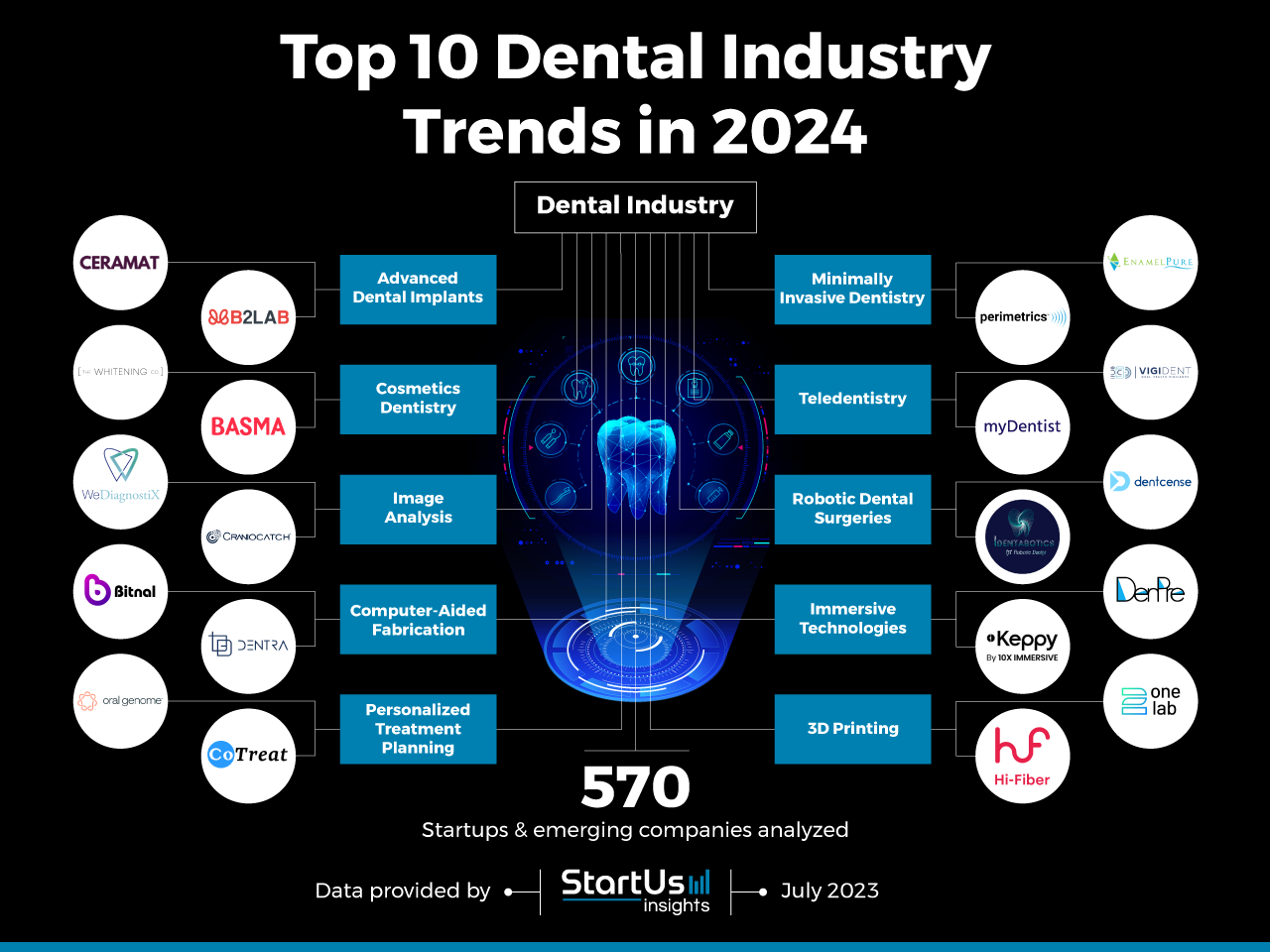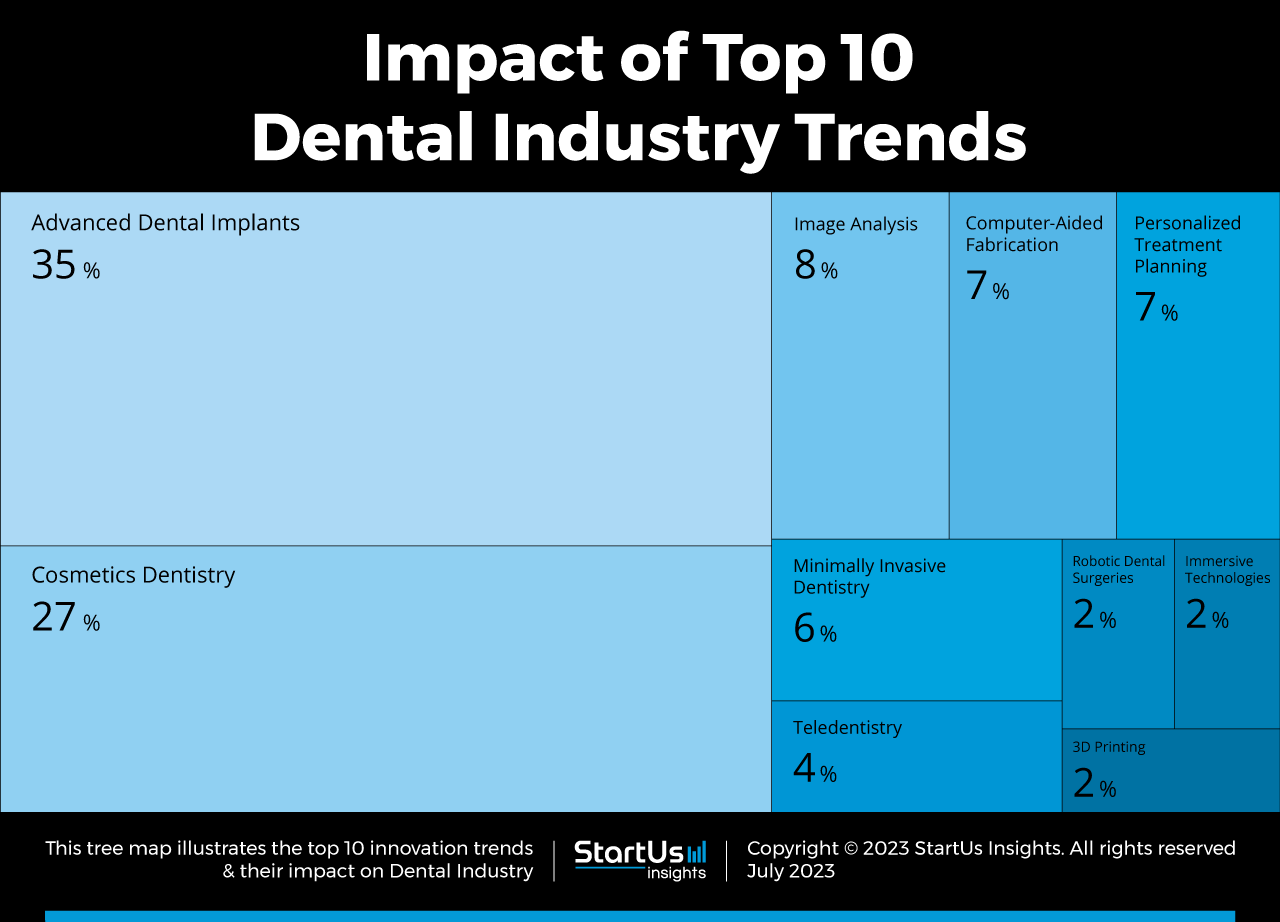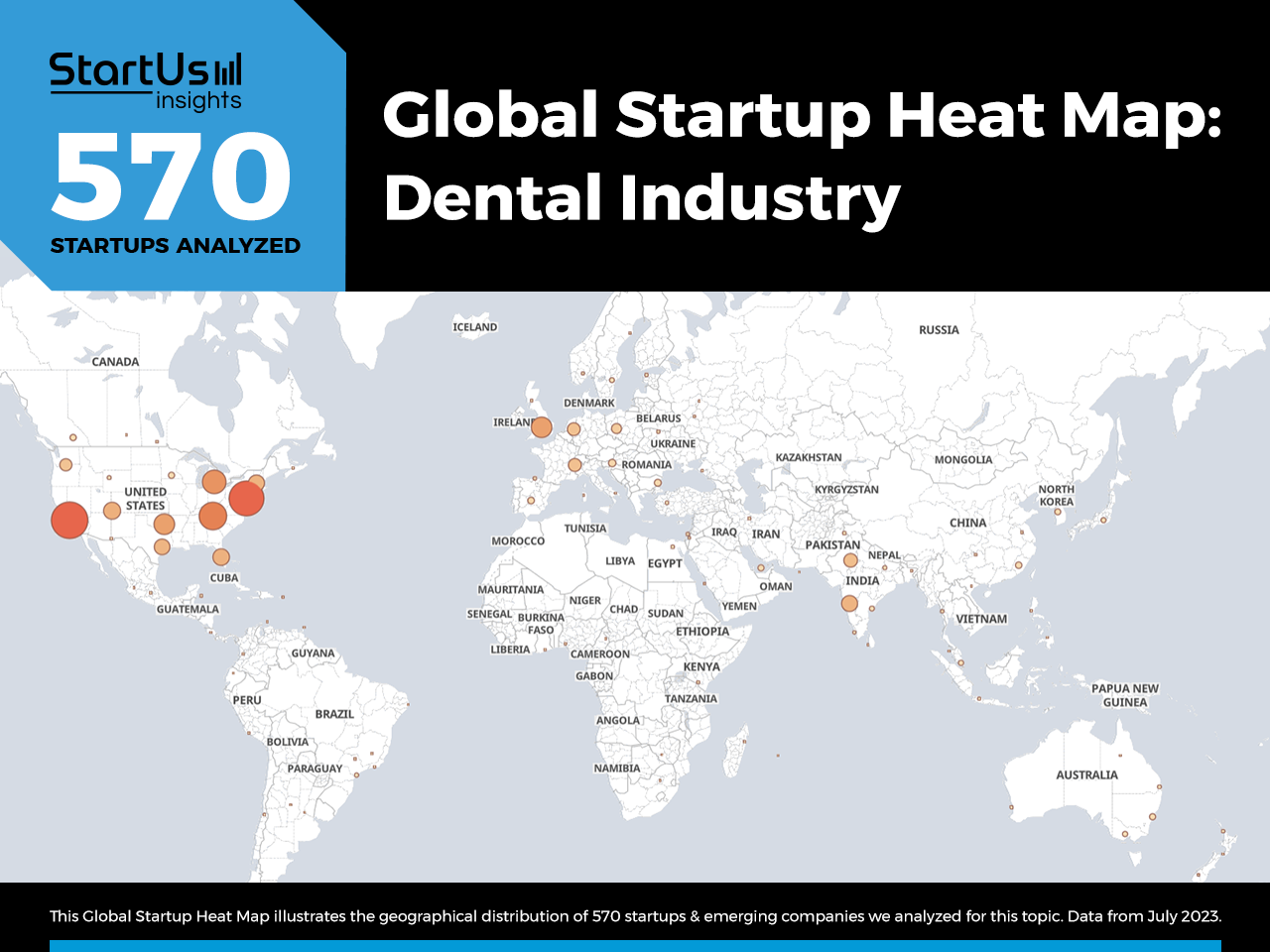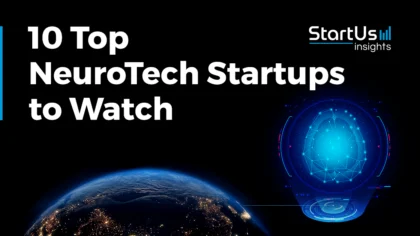Accelerate Productivity in 2025
Reignite Growth Despite the Global Slowdown
Innovative approaches are crucial for addressing the limitations of current dental practices and enhancing patient outcomes. Technologies like computer-aided fabrication, image analysis, and 3D printing improve the standard of care, precision, and efficiency in dentistry. Startups drive this transformation by experimenting with emerging and established technologies to deliver personalized treatment plans and minimally invasive procedures. These advancements enhance diagnostic accuracy, streamline workflows, and offer more effective and patient-centric solutions. This report delves deep into the top 10 dental industry trends that are reshaping dental health and smiles.
This article was last updated in August 2024.
Top 10 Trends in Dental Industry (2025)
- Advanced Dental Implants
- Cosmetics Dentistry
- Image Analysis
- Computer-aided Fabrication
- Personalized Treatment Planning
- Minimally Invasive Dentistry
- Teledentistry
- Robotic Dental Surgeries
- Immersive Technologies
- 3D Printing
Innovation Map outlines the Top 10 Dental Trends & 20 Promising Startups
For this in-depth research on the top 10 dentistry trends, we analyzed a sample of 570 global startups & scaleups. This data-driven research provides innovation intelligence that helps you improve strategic decision-making by giving you an overview of emerging technologies in the healthcare industry. In the Dental Industry Innovation Map below, you get a comprehensive overview of the innovation trends & startups that impact your company.
Want to explore all dental industry innovations & trends?
These insights are derived by working with our Big Data & Artificial Intelligence-powered StartUs Insights Discovery Platform, covering 4.7M+ startups & scaleups globally. As the world’s largest resource for data on emerging companies, the SaaS platform enables you to identify relevant technologies and industry trends quickly & exhaustively.
Tree Map reveals the Impact of the Top 10 Trends in Dentistry
Based on the Dentistry Innovation Map, the Tree Map below illustrates the impact of the Top 10 Dental Industry Trends in 2025. Startups develop advanced dental implants that have enhanced stability and longevity. Innovations in cosmetics dentistry focus on aesthetic dental procedures. Further, personalized treatment planning tools optimize dental care by tailoring treatments to individual patients’ needs.
Similarly, image analysis solutions assist dental radiologists in rapid and accurate diagnostics. Device manufacturers use computer-aided fabrication and 3D printing to streamline the production of dental restorations and prosthetics with precision and speed. Minimally invasive dentistry (MID) also preserves healthy tooth structure while treating dental conditions with lasers, night guards, remineralizations, and more.
Further, teledentistry is improving access to dental care and robotic surgeries enhance precision and efficiency during complex dental procedures. Lastly, dental practices increasingly utilize immersive technologies to facilitate patient education and reduce treatment anxiety.
Global Startup Heat Map covers 570 Dental Startups & Scaleups
The Global Startup Heat Map below highlights the global distribution of the 570 exemplary startups & scaleups that we analyzed for this research. Created through the StartUs Insights Discovery Platform, the Heat Map reveals high startup activity in the US, followed by the UK and India. Below, you get to meet 20 out of these 570 promising startups & scaleups as well as the solutions they develop. These dentistry startups are hand-picked based on criteria such as founding year, location, funding raised, & more. Depending on your specific needs, your top picks might look entirely different.
Top 10 Trends in Dental Industry (2025)
1. Advanced Dental Implants
The latest dental implant technologies utilize advanced materials to optimize osseointegration and ensure long-term success and durability. Innovations in dentistry, such as computer-guided implant placement, enable precise positioning for optimal functional and aesthetic results. New dental implant technology & designs, including zygomatic and pterygoid implants, offer solutions for patients with severe bone loss or anatomical limitations. Advances in implant surface technologies further enhance the integration process and accelerate healing.
These innovations contribute to improved patient comfort, reduced treatment timelines, and increased treatment predictability. They also provide reliable, long-lasting solutions for patients with missing teeth, restoring both oral function and confidence. Moreover, novel implants like porcelain veneers, biocompatible zirconia implants, or biomimetic and intelligent implants offer dental restorations that withstand everyday use. Such implants reduce the time for dental rehabilitation treatments and improve patient outcomes.
Ceramat provides Ceramic Implant Coating Powders
Indian startup Ceramat manufactures nanotechnology-based ceramic implant coating powders. Its phase pure nano-hydroxyapatite and thermal plasma-grade hydroxyapatite enable the manufacturing of bone grafting materials. Practitioners use it to fill bone defects and enhance osseointegration. The startup also offers thermal spray-grade hydroxyapatite that exhibits consistent morphological properties for biomedical coating applications. These products find use as biomedical grafts and bone substitutes for oral care as well as for scaffold fabrication and 3D printing.
B2Lab develops Non-Toxic Implants
South Korean startup B2Lab makes a range of dental implants with its acid-free non-toxic composition. The startup’s LaserO is a surface-treated bone fusion-promoting implant fixture with an antibacterial surface neck for periodontitis suppression and delayed implant fixture. Additionally, the startup develops an implant abutment for improved implant-gum bonding and a fixture with an antibacterial surface. These implants improve the success rate and longevity of dental implants, enhancing oral health outcomes for patients.
2. Cosmetics Dentistry
Companies develop solutions to enhance cosmetic dental treatments such as teeth whitening, dental veneers, invisible aligners, dental bonding, and orthodontics. By utilizing advanced materials and techniques, cosmetic dentistry provides natural-looking and long-lasting results for discoloration, misalignment, gaps, and damaged teeth. For instance, digital smile design enhances patients’ smile aesthetics and improves their overall facial harmony. Such solutions create a virtual preview of the final aesthetic outcome before starting the treatment combining functional and oral health considerations.
Further, AI and machine learning increasingly find use in enhancing treatment planning and outcome prediction in cosmetic dentistry. Computer-aided design (CAD)/computer-aided manufacturing (CAM) technology provides precise and efficient production of restorations such as crowns and veneers. This, in turn, improves patient aesthetics and boosts their confidence and overall well-being.
The Whitening Co makes a Teeth Whitening Kit
New Zealand-based startup The Whitening Co offers the Essentials Kit, an FDA-approved at-home teeth whitening solution. The kit includes two pre-filled white pens – one for easy application and another black light for curing the formula. The black light is wireless, rechargeable, and features a built-in timer. The startup’s dental-grade whitening formula ensures teeth whitening results and improves affordability.
Basma provides Invisible Aligners
Basma is a UK-based startup that offers invisible orthodontic braces for teeth straightening. The users order a pre-treatment kit to take their teeth impressions at home or book a scan at the startup’s partner clinics. The startup designs personalized treatment plans and customized invisible braces according to the impressions and showcases a 3D preview of the expected results.
Additionally, the startup provides remote online monitoring and progress tracking. Basma thus makes teeth straightening more accessible and affordable for patients while enabling dentists to extend their practice outside of clinics.
3. Image Analysis for Dentistry
Advanced algorithms and machine learning enhance the interpretation of dental images, like X-rays, CT, and intraoral scans. Automated detection and predictive analytics further enable early diagnosis of dental conditions, including tooth decay, bone loss, periodontal disease, and oral lesions. Image analysis algorithms identify and quantify dental caries, periodontal diseases, and anatomical abnormalities improving the precision and efficiency of diagnosis.
Image analytics aids in the evaluation of treatment outcomes and monitoring of disease progression over time. It also enables digital workflow integration and treatment simulation to bring consistency to patient care. This empowers dentists to improve diagnostic accuracy, reduce manual effort, and optimize implant placement, orthodontic treatment, and restorative procedures.
WeDiagnostiX aids Dental Image Processing
French startup WeDiagnostiX develops a cloud-based AI-powered dental image processing system. The startup’s AI reads and interprets 2D dental panoramic radiographs and 3D cone beam computed tomography (CBCT) dental X-rays to produce reports. It is a decision support tool and provides a precise second opinion to improve patient communication and treatment adherence.
WeDiagnostiX’s system also integrates with the practitioner’s imaging and patient management software. This way, it delivers diagnostic assistance and revenue optimization as well as improves patient engagement and education. Moreover, it minimizes the risk of error and increases the detection rate of oral pathologies.
CranioCatch advances 2D Radiograph Analysis
Turkish startup CranioCatch offers AI solutions to improve dental disease detection and oral health. The startup’s AI provides rapid diagnoses and cephalometric analysis from radiographs. It enables treatment personalization to streamline patient follow-up and treatment control. This improves diagnostic accuracy and increases patient satisfaction. Moreover, the startup offers modules for radiography annotation and practical dental education for dental-maxillofacial anatomy and pathologies.
4. Computer-Aided Dental Fabrication
CAF leverages digital technologies for the design and production of dental restorations and prosthetics. Dental hospitals utilize CAF for precise and accurate fabrication of dental devices through computer-aided design, 3D modeling, and computer-aided manufacturing. This automates fabrication and reduces human errors while enabling customization for optimal fitness and functionality of dental restorations.
Dental companies build smart intraoral scanners to create restorations from 3D imaging that precisely match the patient’s unique dental anatomy. Additionally, CAF enables dentists to use a range of materials from ceramics to metal alloys based on the patient’s specific needs. CAD and CAM technology minimize material waste in dental product fabrication and further reduce costs. Lastly, CAF enhances the communication and collaboration between dental professionals and laboratories, streamlining workflows and reducing turnaround times.
Bitnal provides Automatic Dental Modeling
South Korean startup Bitnal develops generative AI-based automatic dental modeling algorithms. The startup’s AI models acquire patients’ oral environment data to automatically design personalized prostheses such as bridge teeth, implants, and dentures. The system utilizes deep learning-based 3D object implementation algorithms on existing 2D dental data to automatically generate low-computation volume 3D designs.
This approach prevents precision degradation while providing compatibility with existing 3D printers, CAM equipment, and 3D scanners. Bitnal’s technology significantly reduces the time to create high-quality designs through automation and eliminates the need for dental technician interventions.
Asvin Tech Biodent simplifies Intraoral Scanning
Indian startup Asvin Tech Biodent builds DENTRA, an AI-powered intraoral 3D scanning platform to streamline the workflow for dentists. The platform enables dentists to scan and upload 3D oral impressions and receive real-time updates on dental product fabrication. This automates workflow and improves quality control checks, offering accurate and cost-effective products efficiently.
5. Personalized Dental Treatment Planning
Tools for personalized treatment planning leverage advanced diagnostic tools, imaging technologies, and digital workflows to enhance precision and accuracy in dental procedures. Treatment personalization promotes evidence-based decision-making and accounts for patient-specific factors, improving predictability, patient satisfaction, and treatment outcomes. Additionally, personalized dental planning optimizes resource utilization by streamlining workflows and maximizing efficiency.
Such tools integrate with digital systems like CAD, CAM, and intraoral scanning to simplify the creation of precise restorations and prosthetics. They take factors such as the patient’s dental history, oral health assessment, and individual preferences to generate targeted and tailored treatment. Further, these specialized treatment planning tools improve procedure predictability and enhance patient satisfaction in their treatment journey.
Oral Genome provides an Oral Genome Test
US-based startup Oral Genome creates a home genome test for the early detection of oral conditions, enabling preventive oral care. The startup utilizes smartphone cameras to scan saliva tests and its app leverages computer vision and ML to spot undetected oral health conditions. Further, it provides instantaneous results and personalized evidence-based insights on oral health. The startup’s solution empowers dentists with personalized and deeper insights into patients’ oral health conditions remotely and advances preventive care.
CoTreat delivers Evidence-based Treatments
Australian startup CoTreat builds the CoTreat Navigator, an AI-powered tool that supports dentists in diagnosis and treatment planning. It integrates with existing workflows and analyzes patient images and radiographs systematically. The findings are then presented to the dentist in a prioritized form, along with a comprehensive report. This supports the dentist in their examination and aids in the formation of a treatment plan. As a result, the tool minimizes diagnostic errors, improves patient outcomes, and enhances communication within dental teams.
Find out how 10 emerging technologies shape your industry!
6. Minimally Invasive Dentistry
Minimally invasive dental practices minimize the need for invasive procedures like drilling and extraction. They include preventive dentistry protocols that promote regular screenings and treatments such as sealants and fluoride applications to prevent dental disease progression. MID also utilizes remineralization techniques to reverse early stages of tooth decay, strengthening tooth enamel, and reducing the need for invasive restorations.
Similarly, non-invasive procedures, such as lasers and air abrasion, offer precise treatment options with minimal discomfort for patients. These innovations improve the patient experience while reducing dental anxiety. MID also minimizes exposure to radiation while preserving possible natural tooth structure.
Enamel Pure offers Laser Fluoride Treatments
US-based startup Enamel Pure provides a dental technology that combines laser purification and fluoride treatment to enhance enamel resistance to acid. The technology directs a carbon dioxide (CO2) laser beam over the exposed surfaces of teeth. It removes plaque, bacteria, and impurities that are susceptible to acid dissolution from the enamel without causing any damage. Fluoride application follows the laser treatment to provide a second layer of protection. Enamel Pure empowers dentists to purify and preserve their patients’ dental enamel by preventing tooth erosion.
Perimetrics enables Radiation-free Tooth Diagnosis
US-based startup Perimetrics develops InnerView AI, a diagnostic device based on its proprietary quantitative percussion diagnostics (QPD) technology to detect teeth damage. The QPD technology applies light, painless percussive tapping on each tooth to identify specific types of damage in real-time.
InnerView AI is also compatible with existing practice management systems and features a cloud-based AI platform for diagnostic analysis. It provides dentists with a fast, non-invasive, pain-free, and radiation-free method of diagnosing dental cracks, tooth mobility, and failing restorations.
7. Teledentistry
Teledentistry enables remote delivery of dental care through virtual consultations, assessments, and treatment planning. This approach expands access to dental care, particularly in underserved areas, rural communities, and individuals with limited mobility. Dental hospitals use teledentistry to provide timely guidance, oral health education, and self-care instructions to patients. It enhances patient engagement and empowerment, promoting oral health literacy and encouraging proactive oral hygiene practices.
Moreover, teledentistry improves continuity of care by enabling remote treatment progress monitoring, follow-up, and post-operative consultations. It streamlines workflows, optimizes resources, and reduces costs for dental practices. Startups are building secure and privacy-compliant teledentistry platforms to ensure patient information confidentiality as digitizing operations makes IT infrastructure more prone to cyber threats.
Vigident simplifies Elderly Oral Health Monitoring
Belgian startup Vigident offers a remote oral health monitoring solution, focusing on prevention for elderly individuals. The startup’s application enables remote monitoring and dental evaluation by analyzing standardized dental arch and prosthesis photos. It also provides visual digital marking of dental prostheses and links to the owner’s name to simplify returns.
The management and care staff of senior care institutions use Vigident’s app to provide continuity of oral hygiene control for residents. It reduces unnecessary trips and enables the implementation of bucco-dental-prosthetic assessment during admission, continuity of care, or emergency teleconsultation.
Teledentix offers a Cloud-based Teledentistry Platform
US-based startup Teledentix provides a cloud-based teledentistry platform for virtual dental care. It enables dental professionals to manage virtual consultations, patient records, scheduling, referrals, and treatment plans in a secure, HIPAA-compliant environment. The platform also allows providers to conduct video consultations, capture and store clinical images, and communicate with patients and other healthcare providers.
The platform also features customizable online forms, remote case presentations, multisite scheduling, and patient portals to offer access to billing, educational resources, and appointment management. Teledentix thus facilitates the rapid adoption of teledentistry while enhancing patient care.
8. Robotic Dental Surgeries
Robotic technologies for dental practices offer enhanced precision, accuracy, consistency, and success rates for surgical procedures. Automation of dental surgeries reduces human error, optimizes workflow efficiency, and decreases procedural time. Such systems also enhance dental healthcare access to hard-to-reach areas, enabling dentists to perform intricate procedures with improved visibility and control.
Robotic surgeries also offer real-time feedback and intraoperative imaging to aid decision-making and treatment planning. Innovative companies further utilize AI for robotic process automation (RPA) to analyze vast amounts of data and assist in treatment guidance. These innovations pave the way for minimally invasive approaches, reduce patient discomfort, slash recovery times, and improve treatment outcomes.
Dentcense develops a Dentistry Robotic System
Finnish startup Dentcense builds a robotic arms system that provides dentists with advanced instruments for performing robotic-assisted operations and treatments remotely. Its advanced VR monitoring system provides a magnified 3D view of the oral area, enhancing precision during procedures.
The autonomous storage system further enables the robotic arm to automatically switch to the required instruments and materials as per the surgeon’s instruction. Its advanced remote operation console is an intuitive control interface that allows dentists to manipulate and perform tasks remotely. The startup’s products enhance the efficiency and effectiveness of dental procedures.
IDentaBotics makes a Medical Robotic Arm
Egyptian startup IDentaBotics combines AI and robotics to create an autonomous dental device. The device conducts repeated procedures for extended periods, enhancing the overall quality of patient care. It provides painless treatment and saves time for both the dentist and the patient. The technology allows for remote treatment operations when necessary and facilitates dental implant placement while making dental treatments safer and more efficient.
9. Immersive Technologies in Dentistry
Virtual reality (VR), augmented reality (AR), and mixed reality (MR) enhance dental education, training, and patient experiences. Dental practitioners leverage immersive technologies to provide realistic and interactive simulations for dental students and professionals. This allows for hands-on practice. These technologies also enable advanced visualization of complex dental procedures. Consequently, immersive solutions facilitate treatment planning, communication, and patient engagement.
With the integration of haptic feedback and gesture recognition, these technologies enhance the sense of touch and enable precise manipulation of virtual objects. Further, AR and VR facilitate collaborative workflows, allowing dental teams to remotely consult and share expertise. Startups utilize immersive technologies to also build virtual environments that reduce treatment anxiety and enable virtual tours of dental facilities.
Dental Prediction provides Extended Reality (XR) Models for Dentist Training
Japanese startup Dental Prediction develops DenPre 3D Lab that utilizes 3D data and XR to advance dentist training. The startup’s XR models are also utilized in the production of dental models using data analysis, 3D printing, model hardening, and polishing.
Additionally, the startup’s remote surgery service utilizes its XR models for remote preoperative, intraoperative, and postoperative support from supervising physicians. The startup thus facilitates remote education dental education, medical support training, and patient education.
10X Immersive facilitates VR-based Pain Management
US-based startup 10X Immersive offers a VR-based solution to manage dental pain and anxiety. The startup’s dental pain management system provides special content that distracts patients during dental procedures to ensure an anxiety and stress-free dental experience. The VR system is lightweight, portable, and equipped with 4K visuals to deliver immersive experiences.
The VR system also features a companion app, a built-in smart cooling system, and a UVC sterilization box for sanitizing devices between uses. Dental practices use the startup’s solution to enhance patient experience, increase customer satisfaction, and improve retention rates.
10. Dental 3D Printing
Additive manufacturing enables the production of highly accurate and customized dental devices, restorations, and prosthetics. With it, dentists create precise dental models, surgical guides, aligners, and crowns, enhancing treatment execution. It also offers efficient and cost-effective production of complex dental structures with reduced turnaround times. 3D printing enables the customization of dental implants, ensuring optimal fit and functionality for each patient.
Moreover, 3D printing facilitates the development of patient-specific anatomical models for preoperative simulations and educational purposes. It supports advances in regenerative dentistry by fabricating biocompatible scaffolds and tissue engineering constructs. This technology streamlines workflows, improves dental treatment outcomes, and enhances patient experiences.
2oneLab builds a Dental 3D Printer
German startup 2oneLab builds 2CREATE, a dental 3D printer to create custom dental devices such as crowns, bridges, implants, abutments, and dentures. It creates dental prosthetics tailored to an individual dental structure to ensure better fit and function for patients. This significantly decreases the time to produce and deliver dental prosthetics while enabling workflow scalability. Further, it reduces material waste and allows dental labs to produce customized prosthetics and orthotics.
Hi-Fiber provides 3D-printed Dental Reinforcements
Italian startup Hi-Fiber leverages its patented technology to create customized dental prosthetics using 3D printing. The startup’s digital and biomechanical technology produces a continuous fiber framework customized for each patient. Its 3D printing process ensures accuracy, efficiency, and maximum performance of the pre-tensioned continuous fibers. This ensures that the resulting reinforcement bar closely mimics natural bone behavior and offers higher strength.
Hi-Fiber’s 3D-printed reinforcements provide full armor, and immediate load prostheses, partial and removable dentures, orthodontic splints, as well as Maryland bridges. The technology enables significant material and resource savings compared to traditional production methods.
Discover all Dental Trends, Technologies & Startups
AI-supported tools, digitization, and patient-centric telehealth platforms are becoming common in dental practices. Dental implant manufacturers are also leveraging bioactive materials for dental restorations and implants. Using such material innovations, dental researchers are enhancing antibacterial properties and stimulating tissue regeneration.
This way, the dental industry leverages innovative technologies to advance dentistry and counter challenges effectively and sustainably. The trends in dentistry and startups outlined in this report only scratch the surface of trends that we identified during our data-driven innovation & startup scouting process. Identifying new opportunities & emerging technologies to implement into your business goes a long way in gaining a competitive advantage. So work with us on your next innovation project.











